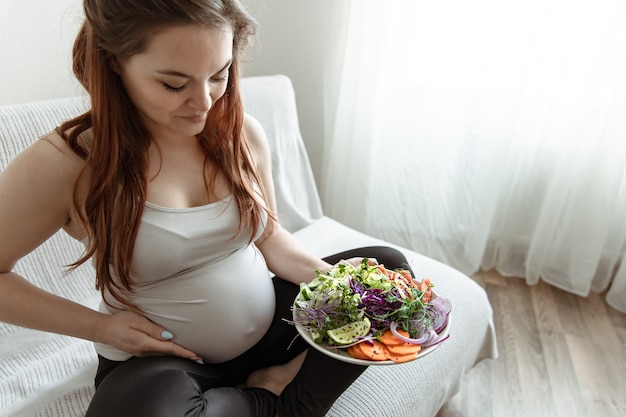
Every woman dreams of having a healthy baby, and this journey begins the moment conception occurs. As a mother, it’s your responsibility to prioritize your baby’s health both during pregnancy and after birth. Many believe that the prenatal period is one of the most crucial times for your baby’s development, as their body and mind rely heavily on your lifestyle choices.
Taking care of your body while pregnant means being mindful of what you eat, how you move, the medications you take, and even your mental well-being. Maintaining an overall awareness of your health is one of the best gifts you can give to your baby.
### Nutrition
The foundation of a healthy pregnancy starts with paying attention to your diet. While most people know that substances like alcohol, tobacco, and illegal drugs are harmful during pregnancy, staying healthy involves more than just avoiding these. Keep in mind that you’re now eating for two, but that doesn’t necessarily mean doubling your portions. You only need about 300 extra calories a day.
Here’s how to maintain a balanced diet to nourish yourself and your baby:
– Eat 6–11 servings of bread or whole grains daily.
– Include 2–4 servings of fruit and 4 or more servings of vegetables.
– Add iron-rich foods and high-fiber options into your meals.
– Have at least one food rich in Vitamin C and one rich in Vitamin A every day.
– Include Folic Acid-rich foods to support brain and spinal cord development.
– Drink plenty of water to stay hydrated.
High-fiber foods, like whole grains, beans, nuts, artichokes, and fruits like pears and raspberries, promote heart health, which is key to giving your baby the nutrients they need. Iron is another essential nutrient, as it helps increase hemoglobin in your blood, which supports your baby’s growth. Good iron sources include red meat, eggs, spinach, and fortified cereals.
Vitamin C contributes to tissue repair, immune health, and strong bones. You’ll find it in foods like oranges, peppers, and leafy greens. Vitamin A is equally important because it supports the development of your baby’s heart, lungs, eyes, and bones. Sweet potatoes, carrots, and apricots are great choices. Lastly, Folic Acid plays a critical role in preventing birth defects and can be found in foods like broccoli, citrus fruits, and dark leafy greens.
Hydration is vital during pregnancy since your body needs more water than usual. Drinking water, juices, or eating water-rich foods like melons and cucumbers can help you stay properly hydrated. Sticking to these dietary guidelines gives your baby the best head start in life.
### Exercise
While eating well is essential, don’t underestimate the value of staying active during pregnancy. Although morning sickness and extra weight can make it tough, keeping your body moving is worth the effort. Exercising helps manage your weight, maintain flexibility, and support your baby’s development.
If you’re used to gym workouts, you might still be able to continue them, especially in the early stages of pregnancy. However, remember that your balance and center of gravity may shift, increasing your risk of falling. Intense exercise can also redirect blood flow away from your baby, so it’s crucial to stay cautious and focus on safe activities.
For those who prefer not to go to the gym, there are many effective ways to exercise at home. Light daily activities, like walking, stretching, or dancing around the house, are beneficial. Low-impact exercises like swimming and stationary cycling are also great options. Just avoid heavy lifting, contact sports, or exercises where you risk losing your balance. Regular, moderate activity is better than bursts of intense workouts and is safer for both you and your baby.
When done right, exercise can make your pregnancy more comfortable, help prepare your body for labor, and even reduce the need for medical interventions. Just be mindful of your limits and consult your doctor if you’re unsure about starting a new routine.
### Vitamins and Medications
While eating well covers most nutritional needs, taking prenatal vitamins provides extra assurance. The most important ones are Folic Acid, Iron, and Calcium, which support your baby’s growth and help prevent birth defects. If your regular diet doesn’t include enough of these, prenatal vitamins can fill in the gaps.
However, medications during pregnancy require more caution. Some can negatively affect your baby, so always talk to your doctor before starting or stopping any medication. If you’re already taking medications before becoming pregnant, consult your healthcare provider to ensure they’re safe for you and your baby.
### Mental Health
Pregnancy comes with hormonal changes, which can sometimes take a toll on your mental health. These changes don’t offer protection against mental illnesses; in fact, anxiety and depression are quite common during this time.
Depression can occur during pregnancy or after birth, known as postpartum depression. If you feel excessively tired, struggle to concentrate, have trouble sleeping, or experience recurrent negative thoughts, reach out to your doctor. Anxiety during pregnancy can manifest as constant worry, panic attacks, or unsettling thoughts about your baby’s safety.
Both conditions can be managed with therapy or medication, but it’s vital not to self-medicate. Instead, speak with your healthcare provider to find the best treatment for you and your baby. A healthy mind is just as important as a healthy body when it comes to supporting your baby’s well-being.
### Final Thoughts
Caring for your body and mind throughout pregnancy sets the foundation for your baby’s health and happiness. By eating well, staying active, taking the right vitamins, and nurturing your mental health, you’re giving your child the best possible start in life.